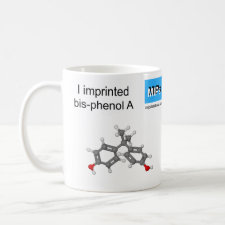
Authors: Zhang JJ, Chen Y, Wu WY, Wang ZP, Chu YJ, Chen XH
Article Title: Hollow porous dummy molecularly imprinted polymer as a sorbent of solid-phase extraction combined with accelerated solvent extraction for determination of eight bisphenols in plastic products.
Publication date: 2019
Journal: Microchemical Journal
Volume: 145
Page numbers: 1176-1184.
DOI: 10.1016/j.microc.2018.12.031
Alternative URL: https://www.sciencedirect.com/science/article/pii/S0026265X18309986
Abstract: In this study, a highly selective and binding hollow porous dummy molecularly imprinted polymer (HPDMIP) was prepared for the separation and determination of bisphenols (BPs) in plastic products using bisphenol AF (BPAF) as dummy template, 4-vinylpyridine as the functional monomer, and MCM-48 as sacrificial support. HPDMIP was characterized by FT-IR spectroscopy, scanning electron microscope, nitrogen adsorption experiment and thermo-gravimetric analysis. Adsorption and selectivity experiments revealed that HPDMIP had a superior adsorption capacity and fast binding kinetics for recognizing BPs. Therefore, a perfect method using HPDMIP as a sorbent material for solid-phase extraction (SPE) was developed, which achieved specific adsorption and enrichment of trace BPs in complex samples. In addition, accelerated solvent extraction (ASE) along with SPE were used as pretreatment method for extracting and concentrating the BPs, and the BPs were determined based on UHPLC-MS/MS. The conditions of ASE and SPE were thoroughly investigated and optimized. Meanwhile, in the ASE proceeding, a Box-Behnken design was applied. Under the optimal conditions, each target analyte had a good linearity between 0.1 and 50 μg L-1 with regression coefficients in the range of 0.9967-0.9995. Limits of detection and quantification varied from 0.02 to 0.6 μg L-1 and 0.05 to 2 μg L-1, respectively. The spiking recoveries between 50.8 and 138.31% for samples spiked at different concentration levels were achieved. The developed method eliminated the effect of template leakage on quantitative analysis and could be applied to extraction and analysis of BPs in different samples with satisfactory results, which provided a useful tool for further studying the BPs in complex samples
Template and target information: dummy template, bisphenol AF, BPAF
Author keywords: Bisphenols, Hollow porous dummy molecularly imprinted polymer, Solid-phase extraction, Accelerated solvent extraction
![]()


Join the Society for Molecular Imprinting

New items RSS feed
Sign-up for e-mail updates:
Choose between receiving an occasional newsletter or more frequent e-mail alerts.
Click here to go to the sign-up page.
Is your name elemental or peptidic? Enter your name and find out by clicking either of the buttons below!
Other products you may like:
 MIPdatabase
MIPdatabase









